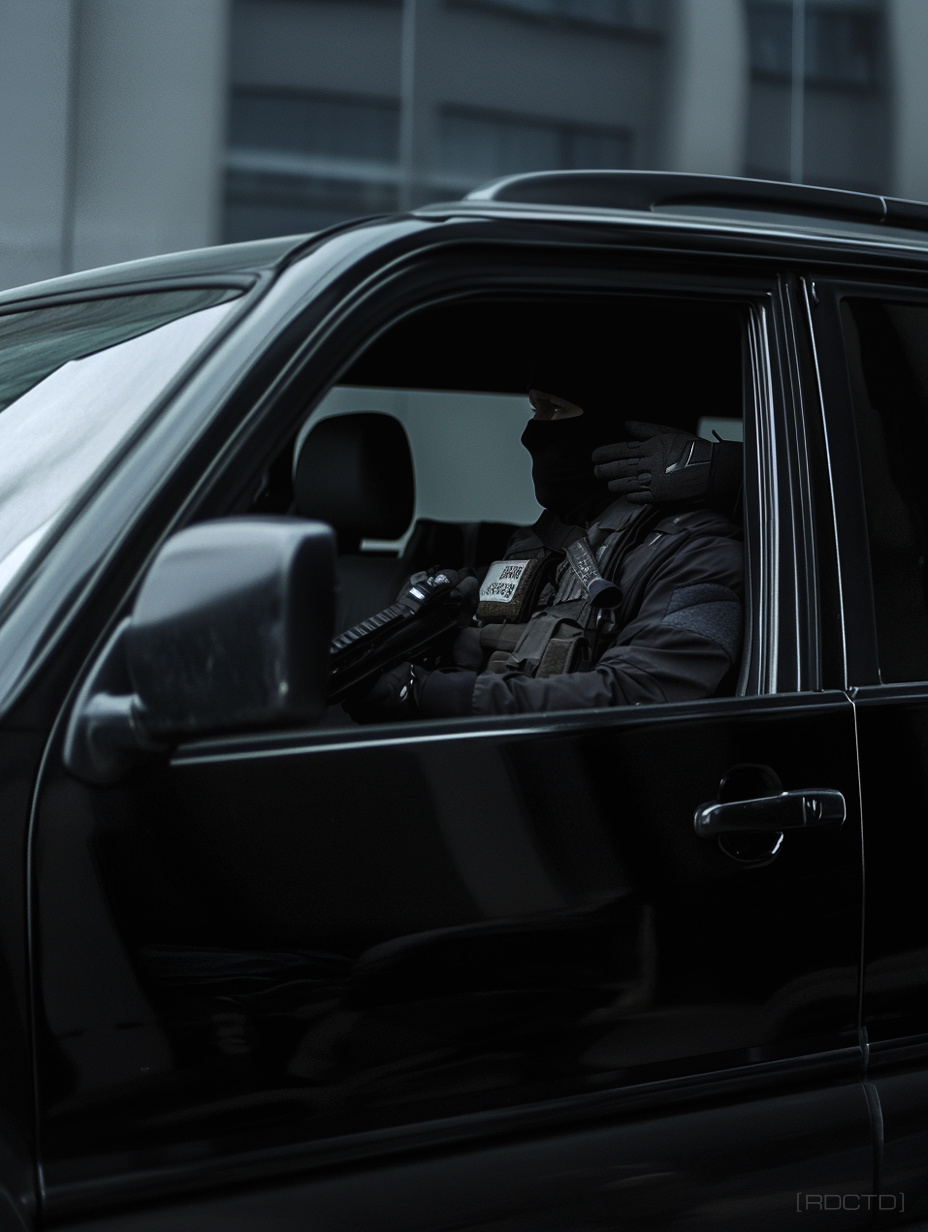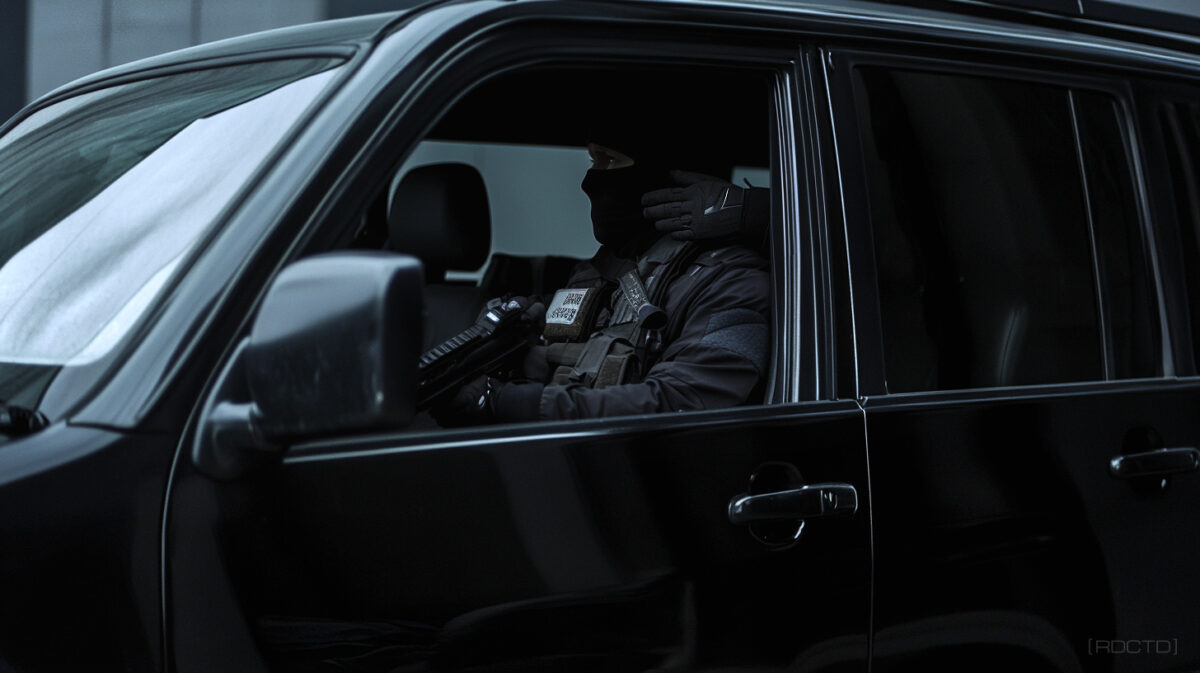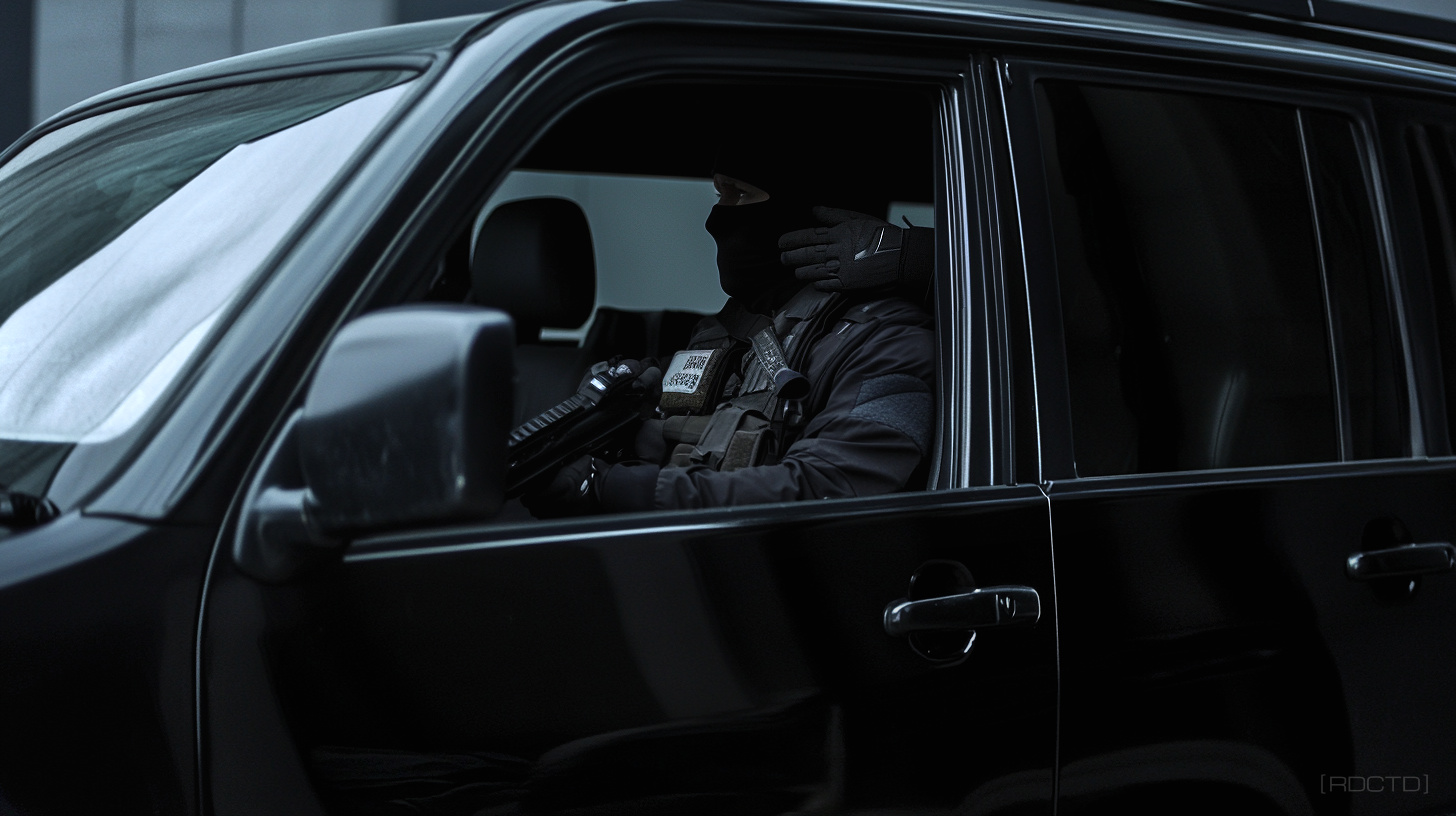 The tradecraft guide to neutralizing a hostile driver from the back seat of a vehicle as a captive passenger, considering common restraints, vehicle layouts, and the physiological weaknesses of a driver.
The tradecraft guide to neutralizing a hostile driver from the back seat of a vehicle as a captive passenger, considering common restraints, vehicle layouts, and the physiological weaknesses of a driver. ![]()
If you’re ever restrained in the back seat of a moving vehicle – whether as a hostage, kidnap victim, or prisoner – your escape and survival may depend on your ability to disable the driver and stop the vehicle. This requires speed, decisiveness, and a willingness to use extreme force when necessary.
Take the driver out of the equation, and the car solves the rest. The back seat is the perfect ambush position.
The driver is both your jailer and the key to your escape. Whether you’re restrained or have full mobility, there are ways to attack the driver’s weaknesses, disrupt the vehicle’s movement, and create a chance to escape.
![]()
![]()
SITUATION ASSESSMENT
Before making a move, you need to assess your environment. The wrong action at the wrong time could worsen your situation, result in a violent response from your captors, or cause a crash that you might not survive. A clear-headed evaluation of your restraints, the vehicle, and your captors’ awareness will determine the best way to act.
![]()
![]()
Assess the Vehicle
Your escape strategy depends heavily on the type of vehicle you’re in. Consider the following factors:
![]()
[Partition or No Partition]
• If the vehicle has a divider (common in police cruisers, taxis, and some armored transport vehicles), your options for direct attack are limited. You’ll need to find another way to disable the vehicle, such as interfering with the driver’s vision or movement.
• If no partition exists, you have direct access to the driver, which allows for chokes, strikes, and control over the steering wheel.
![]()
[Seat Layout and Distance to the Driver]
• Are you directly behind the driver, or is there a center console blocking access?
• Can you reach their neck, head, or arms?
• If you’re in the middle seat, you may have better access to both the driver and the front passenger, which means you’ll need to neutralize them both quickly if they’re a threat.
![]()
[Doors and Windows]
• Are the back doors child-locked? If so, escaping mid-transit may not be an option.
• Are the windows manual or electric? If electric, you might need to disable the driver first before they can lock them remotely.
![]()
[Speed and Surroundings]
• If the vehicle is moving at high speeds on a freeway, causing a crash could be as deadly for you as it is for your captors.
• If you’re in stop-and-go traffic or a city, forcing a sudden stop or drawing attention could give you the chance to escape.
![]()
![]()
Assess the Number of Captors
Is the driver alone, or are there additional captors in the vehicle?
• If you’re outnumbered, neutralizing the driver might not be enough – you may have to deal with one or more armed guards.
• If there’s a front-seat passenger, they will likely try to interfere if you attack the driver. This means you’ll need to be fast and aggressive.
![]()
[Are They Armed?]
• If your captors have firearms, a direct assault could result in getting shot. Disarming a weapon in a confined space requires precise timing and close-quarters combat skills.
• If they have knives, they may be more hesitant to use them while in motion but could become more aggressive if the vehicle stops.
![]()
[Are They Distracted?]
• Is the driver fully engaged in conversation?
• Are they checking a phone, eating, or otherwise preoccupied?
• If their focus is split, you have a better chance of catching them off guard.
![]()
![]()
Assess Your Own Condition
[Are You Restrained?]
• Hands Tied in Front: You have the most flexibility for attacks, particularly chokes and eye gouges.
• Hands Tied Behind: More difficult, but you can still loop your arms over the driver’s head or use your legs.
• Feet Bound: This limits your ability to brace or maneuver, so you may need to rely on upper-body attacks.
![]()
[Are You Injured?]
If you’ve been beaten or drugged, your ability to fight effectively may be compromised.
• If you’ve sustained serious injuries, consider whether you can effectively stop the vehicle before engaging.
![]()
[Are You Armed?]
If you have access to an improvised weapon (pen, seatbelt, handcuffs, etc.), it could be used to attack critical targets more efficiently.
![]()
![]()
Choose the Right Moment
Attacking at the wrong time can get you subdued, restrained further, or even killed. The best time to act depends on a few key factors:
• Low-Speed Situations: If the vehicle is at a stoplight, stuck in traffic, or slowing down for a turn, this is an ideal moment to strike.
• Distracted Driver: If the driver is looking at their phone, adjusting the radio, or engaged in conversation, they’re less likely to react in time.
• One-Handed Driving: If the driver is using only one hand on the wheel, they have less control, making it easier to disrupt the vehicle’s movement.
![]()
![]()
ENGAGING THE DRIVER
When attacking from the back seat, you must focus on quickly and effectively incapacitating the driver before they can react. Your goal is to exploit their physiological vulnerabilities and disrupt their control of the vehicle. This means targeting areas that cause maximum pain, disorientation, or unconsciousness in the shortest amount of time.
![]()
![]()
Control Disruption – Compromising Their Ability to Drive
A driver must be able to see, steer, accelerate, and brake to maintain control of the vehicle. If you can disrupt even one of these functions, you can force them to stop or crash the vehicle.
![]()
[Steering Disruption]
![]()
[Braking Interference]
![]()
[Visual Obstruction]
Blind the driver to cause immediate disorientation:
• Pull a shirt or jacket over their head.
• Cup your hands over their eyes.
• If you have any kind of liquid, throw it in their face.
![]()
[Seatbelt Restriction]
If the driver is wearing a seatbelt, you can use it against them:
• Yank the seatbelt hard to constrict their chest, limiting their breathing.
• If positioned correctly, pull the seatbelt over their throat and use it as a strangulation tool.
![]()
![]()
Physiological Weaknesses – Attacking Vital Areas
The human body has critical weak points that, when attacked, can cause intense pain, unconsciousness, or even death. Since the driver’s focus is on the road, a sudden attack on these areas can give you the upper hand.
![]()
[Throat (Trachea and Carotid Arteries)]
A strike, crush, or choke to the throat can stop breathing or cause unconsciousness.
• Trachea Attack: If your hands are free, use a knife-hand strike or rigid object (pen, keys, seatbelt buckle) to crush the windpipe. If you’re restrained, drive your forearm or wrist restraints into their throat with force.
• Carotid Choke: A properly applied chokehold (rear naked choke) cuts off blood flow to the brain, knocking them unconscious in 8-12 seconds.
![]()
![]()
Eyes (Instant Disorientation and Pain)
The eyes are highly vulnerable – even a light gouge can cause panic.
![]()
[Thumb Gouge]
![]()
![]()
Ears (Balance Disruption and Pain)
![]()
[Ear Shock]
![]()
![]()
Nose (Pain and Watering Eyes)
![]()
[Strike Upward]
![]()
![]()
Jaw and Neck (Knockout Potential)
The jawline and sides of the neck contain nerves that, when struck, can cause unconsciousness.
![]()
[Knife-Hand Strike to the Jaw or Side of the Neck]
A sharp strike to the mandibular nerve (along the jawline) can cause instant pain and possible knockout.
• A strike to the carotid sinus (side of the neck, below the ear) can cause dizziness or unconsciousness.
![]()
![]()
Spinal Disruption (Preventing Movement)
The cervical spine (neck vertebrae) is one of the most vulnerable areas of the body.
![]()
[Neck Snap Attempt (Extreme Cases Only)]
![]()
![]()
Blood Flow Disruption – Choking and Strangulation
The fastest way to incapacitate someone is to cut off their blood supply to the brain. A properly applied chokehold can make the driver unconscious in seconds.
![]()
[Rear Naked Choke (RNC) – Best Unarmed Option]
Position your forearm around the driver’s neck, pressing against both carotid arteries.
• Grab your opposite bicep, reinforcing the hold.
• Squeeze tightly while pulling back and bracing with your legs.
• The driver will pass out within 8-12 seconds if applied correctly.
![]()
[Improvised Garrote (Using Restraints or Clothing]
![]()
![]()

![]()
![]()
WEAPONS AND COUNTERING
![]()
![]()
Using Restraints as Weapons
If you’re bound with handcuffs, zip ties, or rope, you can turn them into tools for attack.
![]()
[Handcuffs or Zip Ties as a Garrote]
![]()
[Seatbelt as a Strangulation Tool]
![]()
![]()
Using the Environment as a Weapon
Almost anything inside a vehicle can be used against the driver.
![]()
[Keys or Pen as a Stabbing Weapon]
Target soft areas like the throat, eyes, or under the jaw.
• A pen or car key driven deep into the neck can sever the carotid artery.
![]()
[Headrest as a Striking Weapon]
Remove the headrest from the front seat (most can be pulled out).
• Use the metal rods to stab the driver in the neck, eye, or ribs.
![]()
[Biting (Last-Resort Desperation Move)]
If you’re restrained and have no other options, bite into the driver’s ear, neck, or arm with full force.
• A deep enough bite can tear flesh and cause massive pain, forcing them to let go of the wheel.
![]()
![]()
Countering an Armed Driver or Guard
If the driver or a front-seat passenger is armed, your attack must be swift and decisive.
![]()
[If They Have a Firearm]
Control the weapon first. Grab their wrist and point the gun away from you.
• If you’re behind them, slam their hand into the dashboard or door to force a drop.
• If the gun is holstered, choke them first before they can draw.
![]()
[If They Have a Knife]
If they turn around to stab, redirect their arm to the side while counterattacking.
• Trap their arm against the seat or jam the knife hand between the door and dashboard.
![]()
![]()
TARGETING THE VEHICLE
If you can’t incapacitate the driver directly, you can force them to stop or crash in a controlled way. The effectiveness of your attack depends on whether you have full mobility, are restrained, or need to use environmental tools to your advantage.
![]()
![]()
Pulling the Handbrake (Best for Low-Speed Situations)
Locate the emergency brake lever (usually between the front seats).
• Yank it up hard and fast – this locks the rear wheels, causing the car to skid, spin out, or stall.
• This is most effective at speeds below 40 mph; at higher speeds, it can cause a dangerous loss of control.
![]()
![]()
Attacking the Steering Wheel
[/ihc-hide-content]
![]()
![]()
AFTER DISABLING THE DRIVER
Disabling the driver is only the first step – what comes next is just as important. Whether the vehicle is still in motion, additional captors are present, or the crash has drawn attention, you need to act fast to secure your escape and survival. The moments immediately after taking control will determine whether you escape, regain control of the vehicle, or face retaliation.
![]()
![]()
Regaining Control of the Vehicle
If the vehicle is still moving when you disable the driver, you must stabilize the situation before it leads to a fatal crash. Your options depend on where you are and whether you can reach the controls.
![]()
[If You Can Reach the Steering Wheel]
Take control immediately to prevent the vehicle from veering off course.
• Keep the wheel steady – even a small overcorrection at high speeds can send the car into a skid.
• If you’re in an urban area, steer toward obstacles that will force a controlled stop (e.g., parked cars, barriers, medians).
![]()
[If You Cannot Reach the Steering Wheel]
If the driver is still semi-conscious, force their hands off the wheel by:
• Breaking their fingers (bend them back sharply).
• Pulling their hands upward away from the wheel.
• Brace for impact if the car is about to crash – position yourself with arms in front of your face and press into the seat.
![]()
![]()
Braking or Stopping the Car
Stopping the vehicle is your top priority once the driver is incapacitated.
![]()
[If You Can Reach the Pedals]
Press the brake firmly but not suddenly to avoid skidding or flipping the car.
• If the vehicle has a manual transmission, disengage the clutch to remove power from the wheels.
![]()
[If You Cannot Reach the Pedals]
![]()
[If a Crash Is Unavoidable]
Protect your head – use your arms to shield your face from debris.
• Brace against the seat and try to stay low to minimize whiplash or ejection.
• After impact, get out fast before captors or bystanders can intervene.
![]()
![]()
Dealing With Additional Captors
If the driver wasn’t alone, the fight isn’t over yet. The remaining captors could still subdue you or regain control of the situation.
![]()
[If There’s a Front-Seat Passenger (Armed or Unarmed]
• If They’re Armed: Control the weapon first. If it’s a firearm, deflect the barrel away from you before attempting a disarm.
• If it’s a knife, trap their arm against the dashboard or door to prevent movement.
• Use the headrest to strike them in the face or kick them in the side of the head from behind.
• If They’re Unarmed: Go for a rear choke or neck crank – they likely aren’t expecting you to attack immediately.
• If they turn to face you, kick them in the face or throat before they can react.
• If you already have a weapon from the driver, use it to neutralize them quickly.
![]()
[If There Are Other Captors in the Back Seat]
• Your first move should be to create space – if you’re still tangled up with the driver, you’re vulnerable.
• If possible, exit the vehicle before engaging. Fighting in a confined space puts you at a disadvantage.
• Use The Environment: Door handles – slam their head into the door frame.
• Seatbelts – wrap around their neck or use as leverage to pin them.
• Loose objects – keys, headrests, or even shoes can be used as impact weapons.
![]()
![]()
Securing a Weapon
Once the driver is disabled, securing a weapon should be a priority. Your captors will likely be armed, and evening the odds can make the difference between escape and recapture.
![]()
[Use The Vehicle Itself as a Weapon]
![]()
![]()
Escaping the Area
Once you have disabled the driver and neutralized any other threats, your next priority is to escape before reinforcements arrive.
![]()
[Exiting the Vehicle]
Check if the doors are locked. If child locks are engaged, you’ll need to exit through a window or force the front door open.
• Use The Windows if Necessary: If the vehicle has electric locks/windows and they’re disabled, kick out the window (aim for the corners, not the center).
• If you’re restrained, use your feet to break the glass.
• Move fast – if bystanders or security forces arrive, they may not know you’re the victim.
![]()
![]()
Destroying Evidence or Covering Your Tracks
If your captors have tracking devices, documents, or communications, you may need to eliminate evidence before escaping.
![]()
[Search The Vehicle]
• Documents with your information
• GPS trackers
• Phones or radios used by the captors
• Your personal effects
![]()
![]()
Disabling the driver is only the beginning of your fight for survival. Once they’re down, the real danger begins. You need to take control of the vehicle, eliminate other threats, and escape before reinforcements arrive.
![]()
// A handcuff around your wrists is a restraint. Around their throat, it’s a solution. You don’t escape by running. You escape by making sure no one can follow.
[INTEL : Hospital Detainment: Escape Guide]
[OPTICS : Operative Disabling a Hostile]
![[RDCTD]](https://rdctd.pro/wp-content/uploads/RDCTD-Covert-Operative-Tradecraft-Guide-LOGO-tk.png)
![[RDCTD]](https://rdctd.pro/wp-content/uploads/RDCTD-Covert-Operative-Tradecraft-Guide-LOGO-mobile.png)

